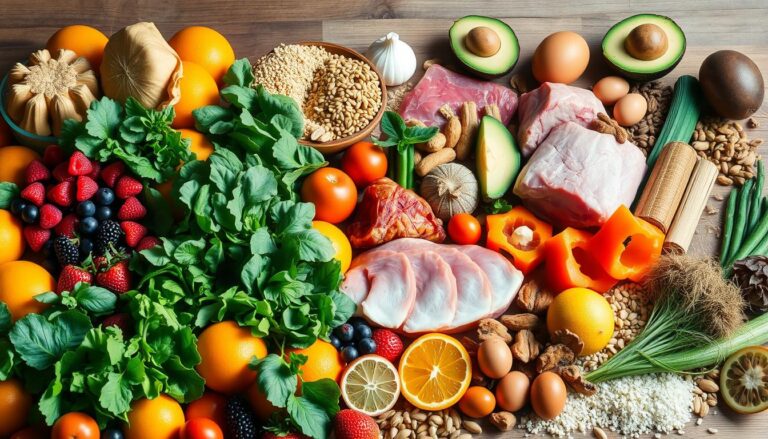How to Prevent Heart Disease with the Best Foods to Eat
Table of Contents
Every heartbeat is a story of hope and the power of good food choices. My family learned that heart health starts with what we eat. It’s not about cutting out food, but about choosing the right ones.
Your heart is more than a muscle; it’s the heart of your life. Eating right is key to keeping it healthy. Knowing which foods are good for your heart helps you take care of it.
How to Prevent Heart Disease : preventing heart disease through diet is simple. Making a few changes can greatly improve your heart health. By eating the right foods and watching your portions, you can keep your heart Preventing heart disease through diet is simple. Making a few changes can greatly improve your heart health. By eating the right foods and watching your portions, you can keep your heart strong.
Key Takeaways
- Diet plays a critical role in heart disease prevention
- Whole foods provide essential nutrients for cardiovascular health
- Small dietary changes can have significant long-term benefits
- Understanding nutrition helps make informed food choices
- Heart health is a holistic approach combining diet and lifestyle
To get better results, you can benefit from the benefits of this nutritional supplement
Understanding Heart Disease and Its Impact on Health
Heart disease is the top killer in the United States, hitting millions yearly. Early screening and checkups are key to better heart health and could save lives.
Knowing your risk is vital, especially with a family history of heart disease. Genetics greatly influence your heart health, with some traits raising your risk.
Common Risk Factors for Heart Disease
- Age: Risk increases for men over 45 and women over 55
- Gender: Men are generally at higher risk earlier in life
- Racial background: African Americans face higher cardiovascular risks
- Genetic predisposition: Close family members with early heart disease
Why Prevention Through Diet Matters
Your diet is key in managing heart disease risk. Nutritional choices can dramatically impact your cardiovascular health, potentially reducing serious heart conditions.
| Risk Factor | Impact Level | Recommended Action |
|---|---|---|
| High Blood Pressure | High | Annual checkups, diet modification |
| Cholesterol Levels | Critical | Regular screening, cholesterol-lowering diet |
| Obesity | Significant | Weight management, exercise |
The Role of Lifestyle Choices
Lifestyle greatly affects heart health. Regular exercise, stress management, and avoiding smoking can lower your risk of heart disease.
Prevention is always better than cure when it comes to heart health.
Early screening and checkups, especially with a family history, help you stay ahead of health challenges. They keep your heart wellness at its best.
Essential Heart-Healthy Nutrients and Their Sources
Knowing the right nutrients is key to keeping your heart healthy. It helps in monitoring cholesterol levels and controlling blood pressure. Eating a variety of essential nutrients is crucial for your heart’s well-being.
Key nutrients are vital for heart health. Here are the most important ones:
- Omega-3 Fatty Acids: Powerful inflammation fighters found in fatty fish
- Fiber: Helps reduce cholesterol and supports overall heart function
- Antioxidants: Protect heart cells from damage
Now, let’s look at the top sources of these nutrients for a healthy heart:
| Nutrient | Top Food Sources | Heart Health Benefits |
|---|---|---|
| Omega-3 Fatty Acids | Salmon, Mackerel, Sardines | Reduces inflammation, lowers heart disease risk |
| Fiber | Oats, Quinoa, Brown Rice | Improves cholesterol levels, supports heart function |
| Antioxidants | Berries, Dark Leafy Greens | Protects heart cells, reduces oxidative stress |
Experts say to get these nutrients from whole foods, not supplements. Eating a variety of nutrient-rich foods helps your heart. It also lowers the risk of heart problems.
Remember, your diet is a powerful tool in preventing heart disease and maintaining optimal health.
How to Prevent Heart Disease Through Dietary Changes
Protecting your heart starts with smart food choices. These choices help you stay at a healthy weight and support your exercise routine. Knowing how to feed your body can greatly lower heart disease risks.

A heart-healthy diet is more than just picking good foods. It’s about planning and sticking to a balanced eating plan.
Creating a Balanced Meal Plan
Creating a good meal plan means thinking about nutrients and portion sizes. Here are some tips:
- Prioritize plant-based foods rich in fiber
- Include lean proteins with each meal
- Select whole grains over refined carbohydrates
- Incorporate diverse vegetables and fruits
Portion Control Guidelines
It’s key to control portion sizes for heart health and a healthy weight. Here’s how:
- Use smaller plates to naturally reduce portion sizes
- Measure servings using your hand as a reference
- Fill half your plate with vegetables
- Practice mindful eating techniques
“Small, consistent dietary changes can lead to significant improvements in heart health over time.” – Cardiovascular Health Experts
Timing Your Meals for Optimal Heart Health
When you eat can affect your heart health. Eating regularly helps keep blood sugar stable and supports metabolism. Try to eat every 3-4 hours and avoid big meals at night.
Combining these diet tips with regular exercise can greatly lower heart disease risks. Heart health is about more than food and exercise. It’s about making mindful choices for a better life.
Best Foods for Cardiovascular Health

Choosing the right foods is key for a healthy diet and heart protection. A smart nutrition plan can lower your heart disease risk and boost your overall health.
Your heart needs nutrient-rich foods for protection. Here are some top picks for heart health:
- Fatty fish rich in omega-3s (salmon, mackerel, sardines)
- Berries packed with antioxidants
- Whole grains like oats and quinoa
- Nuts and seeds
- Legumes and beans
Focus on heart-supporting foods when planning your diet. Dark chocolate with at least 70% cocoa boosts blood flow. Extra virgin olive oil is full of heart-protective fats.
| Food Category | Heart Health Benefits | Recommended Intake |
|---|---|---|
| Fatty Fish | Reduces triglycerides, increases HDL cholesterol | 8 ounces per week |
| Berries | Lowers LDL cholesterol, high in antioxidants | 1-2 servings daily |
| Whole Grains | Improves cholesterol levels, reduces inflammation | 3-5 servings daily |
Try the Mediterranean diet for heart health. It focuses on plants, healthy fats, and less processed foods. This diet supports heart health and helps with quitting smoking by improving overall wellness.
Foods to Limit or Avoid for Heart Health
Keeping your heart healthy starts with what you eat. Some foods can really hurt your heart. It’s key to know which ones to avoid or eat less of. Making good food choices helps manage stress and keep blood pressure in check.

Understanding Saturated and Trans Fats
Not all fats are the same. Saturated and trans fats are bad for your heart. The American Heart Association says to keep saturated fats under 6% of your daily calories. These bad fats are in:
- Fried foods
- Processed snacks
- Fast food
- Fatty cuts of meat
- Full-fat dairy products
Hidden Sources of Sodium
Sodium can harm your heart without you even realizing it. The AHA advises to limit sodium to 2,300 mg a day. Aim for 1,500 mg if you can. Sneaky sodium sources include:
- Processed frozen meals
- Canned soups
- Packaged snacks
- Condiments and sauces
- Restaurant meals
Impact of Added Sugars
Added sugars are bad for your heart. They can lead to weight gain, inflammation, and heart disease risk. It’s important to cut down on sugar for your heart and stress levels. Watch out for sugar in:
- Sugary beverages
- Desserts
- Packaged cereals
- Flavored yogurts
- Processed snacks
Remember, 80% of cardiovascular disease is preventable through lifestyle changes.
Sample Heart-Healthy Daily Meal Plans
Creating a heart-healthy meal plan is key for a healthy weight and heart wellness. What you eat daily greatly affects heart disease prevention and overall health.
We’ve made two detailed meal plans that follow American Heart Association guidelines. These plans are balanced to give you the best nutrition. They also support your exercise and heart health goals.
1,500-Calorie Heart-Healthy Meal Plan
This meal plan focuses on heart health while providing essential nutrients:
- Total Daily Calories: 1,514
- Protein: 42g
- Carbohydrates: 225g
- Fiber: 42g
- Total Fat: 56g
- Saturated Fat: 9g
- Sodium: 1,394mg
Sample Daily Menu
A typical day might include:
- Breakfast: Oatmeal with berries and almonds (300-350 calories)
- Morning Snack: Greek yogurt with chia seeds
- Lunch: Grilled chicken salad with mixed vegetables (430-510 calories)
- Afternoon Snack: Apple with almond butter
- Dinner: Baked salmon with quinoa and roasted vegetables
Combining these meal plans with regular exercise is crucial. The American Heart Association suggests at least 150 minutes of moderate exercise weekly.
Pro Tip: Always consult with a healthcare professional before starting any new diet or exercise plan, especially if you have pre-existing health conditions.
Incorporating Heart-Healthy Cooking Methods
Protecting your heart starts in the kitchen. Cooking techniques are key to keeping your heart healthy. By picking the right cooking methods and ingredients, you can make tasty meals that are good for your heart.
Healthy Cooking Oils and Alternatives
Choosing the right cooking oils is important for heart health. Experts say to use oils rich in monounsaturated and polyunsaturated fats:
- Olive oil for low to medium-heat cooking
- Avocado oil for high-heat cooking
- Canola oil for baking and sautéing
- Walnut oil for salad dressings
These oils can lower inflammation and help your heart. Quitting smoking and using heart-healthy cooking methods can boost your health.
Low-Sodium Seasoning Options
It’s important to cut down on sodium for heart health. The American Heart Association suggests less than one teaspoon of salt daily. Try these tasty alternatives:
- Fresh herbs like basil, thyme, and rosemary
- Citrus zest and juice
- Garlic and onion powders
- Vinegar and citrus-based marinades
Regular check-ups can help you keep track of your heart health. Using these low-sodium seasoning options with a balanced diet can lower your heart disease risk.
Remember, every meal is an opportunity to support your heart health.
Conclusion
Protecting your heart is a lifelong journey, not just about one meal or day. Even with a family history of heart disease, your diet can lower your risk. It’s key to understand and watch your cholesterol levels for heart health.
Cardiovascular disease cases have doubled, from 271 million in 1990 to 523 million in 2019. This shows how important it is to take care of your heart with good nutrition and lifestyle. By following the heart-healthy tips in this article, you can lower your risk of heart problems.
Your heart health is in your hands. Begin with small, lasting changes like eating more whole foods and less processed stuff. Regular exercise, balanced eating, and health checks can greatly improve your heart health. Prevention is always better than treatment.
Start taking care of your heart today. Every healthy meal, workout, and choice you make helps your heart get stronger. Your future self will thank you for these steps to protect your heart.
FAQ
What are the primary risk factors for heart disease?
Heart disease risks include high cholesterol and blood pressure. Smoking, obesity, and diabetes are also big factors. Age, gender, and family history also matter.
How can diet help prevent heart disease?
Eating right can lower heart disease risk. Focus on whole grains, fruits, and veggies. Choose lean proteins and healthy fats. Avoid saturated fats, sodium, and sugars.
What are the best foods for heart health?
Good heart foods are fatty fish, leafy greens, and whole grains. Berries, nuts, olive oil, avocados, and legumes are also great. They offer fiber, antioxidants, and healthy fats.
How much exercise is recommended for heart disease prevention?
Aim for 150 minutes of moderate exercise weekly. Or do 75 minutes of vigorous exercise. Mix in strength training for best results.
Can genetics influence heart disease risk?
Yes, genetics can affect heart disease risk. But, diet, exercise, and avoiding smoking can help. These lifestyle choices can reduce risk.
How often should I get my cholesterol and blood pressure checked?
Check cholesterol every 4-6 years and blood pressure yearly. More often if you have risk factors. Regular checks can catch problems early.
What cooking methods are best for heart health?
Use steaming, grilling, roasting, and baking for heart health. Avoid deep-frying. Choose olive oil and herbs for flavor instead of salt.
How can stress impact heart health?
Stress can raise blood pressure and cause inflammation. It can lead to unhealthy habits. Manage stress with meditation, exercise, and sleep to protect your heart.







